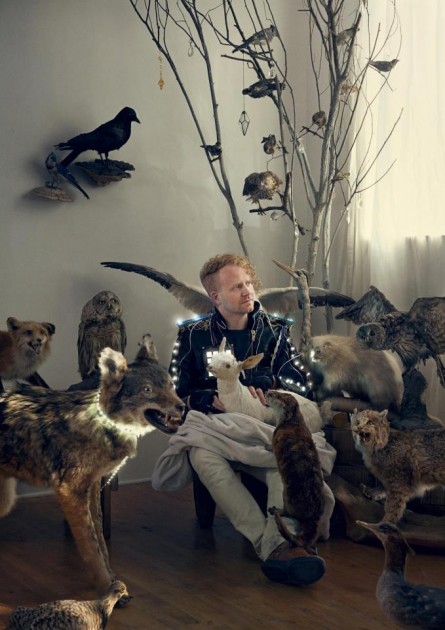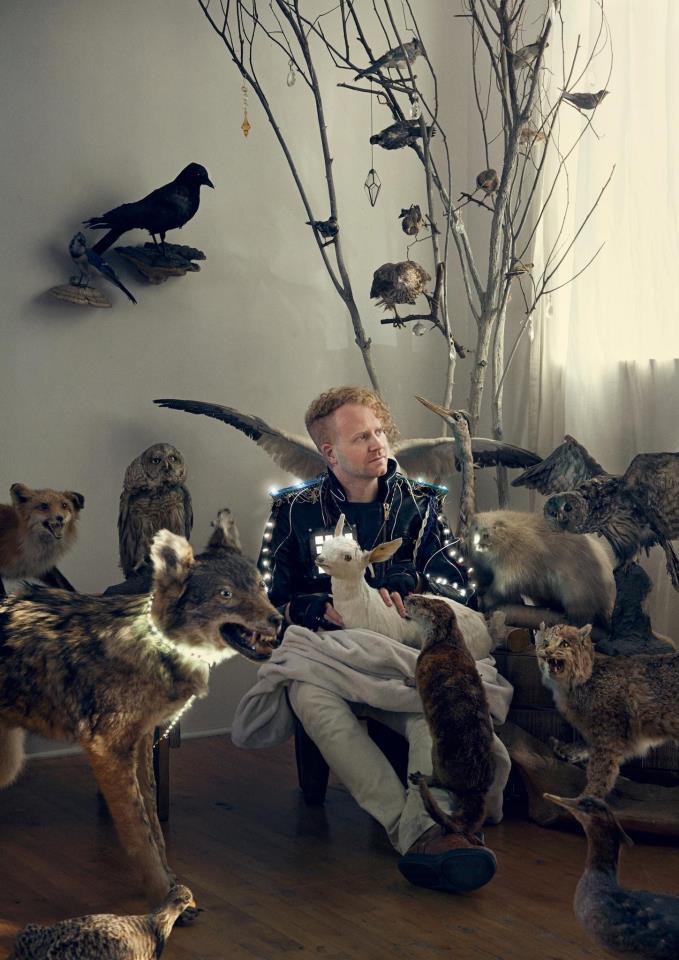
Last September, madcap electro-pop experimentalist Cecil Frena took a handful of songs that had been circulating around the web under the guise of his project GOBBLE GOBBLE and released them, along with a batch of new tracks, under the name Born Gold. The resulting album, Bodysongs, was one of the most furiously engaging and criminally overlooked debuts of 2011. One year later, we contacted Frena to ask about his creative process, his unique live performances, and Born Gold’s new record, Little Sleepwalker, out today on Audraglint Records.
Ryan Stanley (BPM): Born Gold used to be known as GOBBLE GOBBLE, and even some of the songs from Bodysongs were originally circulating under that name. What was the thought process behind that name change? Do you consider Born Gold to be a separate project?
Cecil Frena: Born Gold is the same project – the name change was just another element of its ongoing evolution. I did try to explain it here, if you can read through the winks. The new name and its signifance for me are derived from a deeply personal lyric in the song “Gauze Pillars” on Little Sleepwalker.
BPM: You said in that Forbes piece from earlier this year that you don’t consider Little Sleepwalker to be a pop album in the same way Bodysongs was. What changed in your approach or in the music itself that made you feel that way?
CF: The approaches to each record were starkly different. When I started making Bodysongs I actually set myself a lot of formal restrictions – for example: every song has to be 2:30 or less, every song is written on guitar first and then produced, every song needs to obey conventional pop structure but be structurally surprising or subversive in its own way. I ended up breaking some of those rules, but the overall result in the end was very much commensurate with them. On the other hand, the way I created Little Sleepwalker was much more unstructured. I started with beats and didn’t touch a guitar. Once they began to take shape, I would let the songs follow whatever dark alleys they wanted without concern for repetition or pop payoff. I wrote almost all of the lyrics to the record as I was waking up from dreams, which is part of what gives the record an impressionistic feel. The whole process ended up being much more free-associative than Bodysongs. It was very good for me psychologically to make art that way, despite the fact that I’ve since moved on. It really reinvested me in music, it was almost therapeutic.
“I don’t expect everyone to like everything I do, but you can at least rest assured that the next thing will be different, and that some of the risks will pay off.”
BPM: Was the move to a more unstructured and beat-based approach a conscious decision, or did it come naturally?
CF: I’ve talked a little bit about how I tried to invert myself with this record, and the compositional approach was absolutely a conscious part of that. That being said, it felt real good to let the strictures of the pop format go for a while and just explore. Calling it unstructured is a bit of stretch mind you – there’s nothing jazzy or jammy about Little Sleepwalker. Exploratory for sure – but it’s very much on its own particular set of carefully plotted rails.
BPM: Knowing that you were moving in a very different, more abstract direction compared to Bodysongs, did you feel any trepidation about alienating fans while writing Little Sleepwalker?
CF: I think I felt more trepidation once it was completed and I realized how odd it was. I get very deep tunnel vision when I’m in the throes of work on something; it’s something I’m gradually trying to overcome. I’ve always known that I wouldn’t be able to stick to one thing, so I guess what I’m hoping for are fans that are interested in watching and assessing my evolution. It’s pretty demanding of me, but I am asking for people to engage with me on a artist-level rather than a song or even an album-level. I don’t expect everyone to like everything I do, but you can at least rest assured that the next thing will be different, and that some of the risks will pay off.
“The idea that there was this underground scene of dance music that is more or less run by aesthetes – that was a brand new thing to me.”
I like discographies that are varied and divisive. The other end of that bargain is that I need to be cognizant of my audience and try to make any new risks that I’m taking worth engaging with. I don’t want to make art that satisfies only my most cerebral desires — I want to make music that means something both to myself and other people. I’m still learning to strike the balance of shapeshifting while preserving an essential core of relatability and resonance – it’s an enormous challenge. Little Sleepwalker is an extreme demand on anyone who’s followed me till now because it mutates my voice in a pretty uncompromising way. Usually the voice is the one thing that people cite as uniting an artist’s different works and making them distinctively hers. Taboos always tempt me.
BPM: You’ve also mentioned the influence of club music on this new record. Are there any artists in particular you might cite in particular?
CF: 2011 is really the year where I discovered like the “thing” of club music. I had always listened to some dance music, and I make an annual pilgrimage to MUTEK in Montreal, but the idea that there was this underground scene of dance music that is more or less run by aesthetes – that was a brand new thing to me, and so exciting.
It’s hard to take stock of everyone who really had an impact on me that year, but especially darker, forward-thinking stuff like the Hessle Audio guys and R&S, denser party stuff like Body High and Unknown to the Unknown and then also the kind of UK/US dialogue that was taking place between labels like Fade to Mind, Night Slugs, Luckyme. I actually ended up interning at Body High when I was in LA for a bit in late 2011; they’re two of the very best dudes and just killing it with their release schedule this year.
BPM: What’d you do while interning at Body High?
CF: I just helped with administrative stuff and miscellany while I was there and absorbed it all. I really think there’s an exciting contingent of uniquely American club music that’s bubbling up, and Body High is an important part of that. They’ve been killing it this year, have you heard Sam’s new EP?
BPM: I haven’t!
CF: It’s called 5 Dollar Paradise – it’s club music through and through, not crossover stuff. If you DJ, try dropping one of those tracks – the responses I’ve been getting are nuts!
CF: It’s been a while since I’ve done either a cover or a remix, but for a long time I was very interested in both. I saw the covers as hosannas to some of my very favorite artists – all my covers’ titles involve some sort of acknowledgment of the fact that I am corrupting the material. That being said, I think you should only cover a song if you’re going to ruin it in your own way – make it an act of deference as well as a transgressive smear of personality.
“I’m doing my best at the moment to give people multiple paths into its frosty world in hopes that a few can make their homes there.”
BPM: You toured a lot of the music on Little Sleepwalker over the past year rather than staying with the Bodysongs material. Is there something about that strategy that adds to the finished product?
CF: Oh I don’t think so, I think I just was excited about the new material and felt those particular songs were a good fit with the Grimes tour. I’m trying to resist the urge to only play new material on our next tour, although now it’s looking like I will have yet another new record to tempt me when the time comes. I hope people who saw the Little Sleepwalker tunes live in 2012 identify them on record and have an easier entry to the album that way. But from the beginning I’ve been pretty real about the fact that LS is a record that is just more demanding on the whole than Bodysongs was, and I’m doing my best at the moment to give people multiple paths into its frosty world in hopes that a few can make their homes there.
BPM: Both of the times I saw you perform this year, you were manipulating your instrumentals with a kind of motion sensing jacket rather than a more traditional controller. Where did that whole live set-up come from?
CF: What I’m actually doing is using an Xbox Kinect to map my body. My positional information is translated into dynamic midi information, meaning that my motions cause musical changes, and what any given motion does can change over time. So I can set zones, for example, that if moved through, trigger sounds or manipulate filters, etc. There is then LED feedback in the jacket depending on the type of midi information I’m sending. So the jacket is largely a representational tool for what I’m doing, although it has an MPC style pad and some flex sensors built into it, so it’s technically sending midi as well. The whole thing was inspired by Dangerous-era Michael Jackson tourwear, and I designed it along with my friend Matthew Skopyk, who is a brilliant audio technologist.
BPM: Do you feel like the suit-based method of performance will mesh well with the material you’re gonna be playing on future tours?
CF: I have a host of pretty rad upgrades planned for the jacket. Whether it is foregrounded as the centerpiece of our performance or becomes one element among many is something I’m still debating. My newest songs are a lot more… social.
“I’m asking people to engage with me on an artist-level.”
BPM: You seem to have a pretty close connection with a lot of similarly forward-thinking pop artists like Purity Ring, Grimes, Baths and others. How do your relationships with other musicians influence your own music, if at all?
CF: Given that my friends make some of my very favorite music, I think that’s an interesting question. I identify with all of them in different ways – I think the things we have in common are a major reason we’re close. But then, we only found each other once we’d all already started. With a few of my friends, we’re at the point where we share advice with respect to our works in progress – so we are actually directly influencing each other, or not, depending I suppose on how good that advice is. But everyone is also equally concerned with carving out their own lane – and fortunately for us, we’re all pretty fucking different too.
BPM: You say you’ve moved on from the process you used to create Little Sleepwalker – where are you now with your approach? What can we expect from the future of Born Gold?
CF: I will talk about its sound and structure in more detail in 2013, but for now – the new record I am working on is a return to the craft of pop music, and to my clean vocals. In terms of immediacy, it’s light years beyond what I’ve done to this point and I’m excited to show it to people. My primary struggle at this point in its production is to not screw the songs up – and with anarchistic impulses like mine, that can be a struggle indeed.

